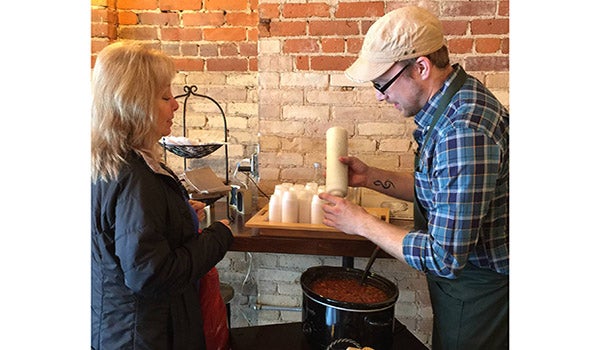A vertical turn
Published 8:38 am Saturday, March 24, 2012

Leader photo/KATIE ROHMAN This rotary garden unit is growing eggplant, peppers and cucumber (shown).
The concept of traditional agriculture — hundreds of acres of soil, tractor equipment, pesticides, transportation costs — is being turned on its head.
An engineer and sustainability expert has sprouted an organic vertical farming operation in a former manufacturing facility in New Buffalo Township.
Milan Kluko, owner of Fountainhead Engineering in New Buffalo, has been experimenting with vertical farming around the U.S. and dabbled in hydroponics in the 1990s.
“I’ve been gardening since I was 10,” said Kluko, who speaks about sustainability issues nationwide and has worked in Antarctica and Europe through his civil and environmental engineering business.
“We are mostly known for innovative, sustainable approaches,” he said.
Vertical farming solves many of the world’s food-growing problems: lack of sun, too much sun, little rain, too much rain and not enough space.
“We are the urban farmers,” Kluko said.
Farming indoors
Kluko had been eyeing a vacant building, formerly Plastic Masters, at 18300 W. U.S. Highway 12, New Buffalo Township, and approached the owners about using some of the property — just over an acre — for a vertical farming business. GSF gained a letter of support from New Buffalo Township in 2011.
Part of the building is home to a temporary tenant, so GSF is renovating more than 17,000-square-feet in the rear of the building.
Fifty wind turbines will power GSF. New Buffalo is ideal for turbines with wind coming off Lake Michigan.
“We enjoy the right type of wind that comes off the lake,” Kluko said.
Solar panels will be installed on the building’s flat roof. Any proposed future expansions would include geothermal heat.
When completed, the facility will house hundreds of vertical garden growing stations and employ as many as 15 people. One acre of indoor farming will be the equivalent of at least 20 acres of outdoor farmland.
Meeting demand
Cost savings in vertical farming is minimal, but the focus is on local, organic produce and local employment, Kluko said.
GSF is marketing itself to grocers, supermarkets and restaurants within a 50-mile radius to meet the customer demand for local, organic produce, said Sandra Thompson, retail and distribution for GSF.
“We’re reducing our carbon imprint” by only transporting produce in a 50-mile radius, Kluko said.
Demand is high for herbs such as basil and cilantro, an ingredient in the nation’s most popular condiment — salsa.
Once GSF has become more established, it will pursue the Chicago market. GSF also wants to educate children and adults about sustainable agriculture through its “Earth Campus.”
Kluko would like to host school groups and an agriculture intern.
The first GSF harvest is slated for around July 4. Five to seven harvests are expected per year.
For more information, visit www.greenspiritfarms.com or call (312) 473-4730.






